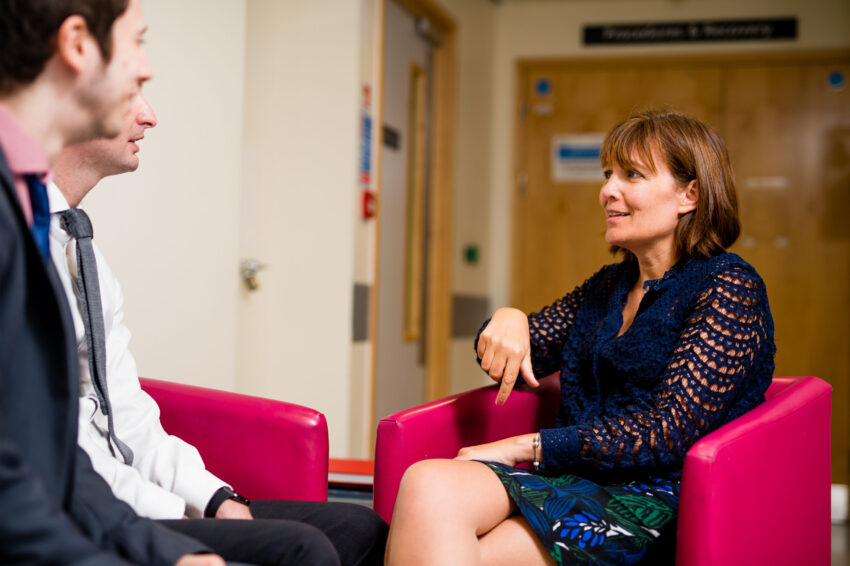At the Assisted Conception Unit we offer fertility treatments for people wanting to use donor eggs, sperm or embryos.
Using donor gametes gives the opportunity of having children to those who are unable to on their own. This could be single people, heterosexual couples or LGBTQ+ couples wanting to start a family.
We do not source or transport donors or donations but work closely with donor organisations and cryobanks.
Private fertility investigations and treatments
Book an appointment today with one of our world-renowned consultants.
Your fertility journey will be consultant-led throughout. Benefit from direct access to your chosen consultant with evening and weekend appointments to suit your schedule.
Whether you would like to assess your fertility potential, receive fertility treatment, or explore fertility preservation, we are here to support you.

What is egg donation?
Egg donation is when eggs are provided by a donor to another woman to get pregnant. The woman can either be the intended parent of the child, or a surrogate mother. Eggs are fertilised by mixing with the intended father’s or chosen sperm, and then the fertilised egg (embryo) is placed into the intended mother’s or surrogate’s uterus (womb).
For female patients experiencing fertility issues, fertility investigations can be used to understand your ability to conceive. Female infertility can be caused by many reasons including egg production, quality of eggs and egg reserve. Using donor eggs is an excellent option when female infertility is preventing a couple or individual from conceiving, such as same-sex couples, older women, women with genetic disorders and women with an intact uterus but no ovaries.
What is sperm donation?
Sperm donation is another third-party reproduction option that can help couples or individuals conceive a baby. In sperm donation, donated semen is used to fertilise a woman’s eggs. Sperm donors can be known or anonymous.
Fertility treatment using donor sperm can be done by intrauterine insemination (IUI), an artificial form of insemination in which the doctor places the concentrated and processed sperm directly in the woman’s uterus. In-vitro fertilisation (IVF) can also be an option in which matured eggs are fertilised with the sperm in a laboratory.
Couples may opt for a sperm donation if male factor infertility is the reason they cannot conceive. In some cases, these issues can be caused by medical conditions or medications. Sperm donation may also be used by same-sex couples or single women.
Fertility counselling is a vital part of all our fertility treatments using donor eggs, sperm or embryos and is offered to both recipients and donors.
Associated donor organisations
We work with a selection of donor organisations and advise patients to explore their options and find an organisation that suits them.
Benefits of using donor eggs
Using an egg donation is sometimes the only option if you’re experiencing untreatable infertility issues such as poor quality or no eggs, age, and genetic disorders. It can also be used with a gestational surrogate.
For patients using IVF with donor eggs, the more IVF cycles you go through the higher your chances are of getting pregnant. Figures show that there is a 59% success rate of pregnancy after the first IVF cycle, a 65% success rate after the second cycle, and an 89% success rate after the third cycle.
Benefits of using donor sperm
If you are a single woman, experiencing male factor infertility or using a gestational surrogate using donor sperm can help you have a child.
For patients using IUI with donor sperm, most women require multiple insemination cycles. A study found the pregnancy rate per cycle to be 17.2%.
Risks of using donor eggs
Using donated eggs can increase the risk of high blood pressure and is also associated with other risks such as:
- premature delivery
- needing a caesarean section
- low birth weight
Risks for the donor include:
- a higher chance of becoming pregnant
- ovarian hyperstimulation syndrome (OHSS) caused by the stimulation stage of the process
Risks of using donor sperm
For some genetic diseases there is no standard testing method on sperm. If the sperm bank doesn’t follow protocols related to handling sperm correctly, an infection could be a risk. However, there are no health risks associated with being a sperm donor.
Treatment packages using donor gametes
Explore our fertility treatment cycles using donor eggs, sperm or embryos below.
View our fertility investigation and treatment prices here. Full treatment costs will be provided in your personalised, costed treatment plan.
Treatment packages do not include purchase or transport of donor gametes. These charges are paid directly to your chosen cryobank and courier, in addition to our import administration fee. Please refer to our fertility price lists for further information.
Treatment will only commence when the purchased donor’s gametes are safely in storage at our facilities.
What is included:
- Nurse consultation and treatment planning.
- Access to online consenting and patient education platform.
- Stimulation scans for egg provider.
- Cycle monitoring scans for embryo recipient.
- Cycle management including monitoring scans and blood tests.
- Egg collection under sedation, including anaesthetic fees and theatre fees.
- Sperm preparation.
- IVF procedure.
- Embryo culture and assessment.
- Embryo transfer procedure.
- Early pregnancy scan or post-treatment consultation.
- Up to six fertility counselling sessions.
- HFEA fertility regulators fee.
What is included:
- Nursing support with treatment plan from Instituto Bernabeu, Spain.
- Screening blood tests if required.
- Assistance with prescription for medication.
- Up to three scans (may include a baseline scan, monitoring scan, early pregnancy scan).
- Mock cycle if required.
- Injection appointment if applicable.
- Pregnancy test (bHCG).
- Referral for fertility counselling if required.
Locations
Our fertility services are available at the following locations:
Discover our fertility experts
Meet our team of leading fertility consultants. From infertility investigations to donor treatments, our specialists are here to provide you with personalised care.